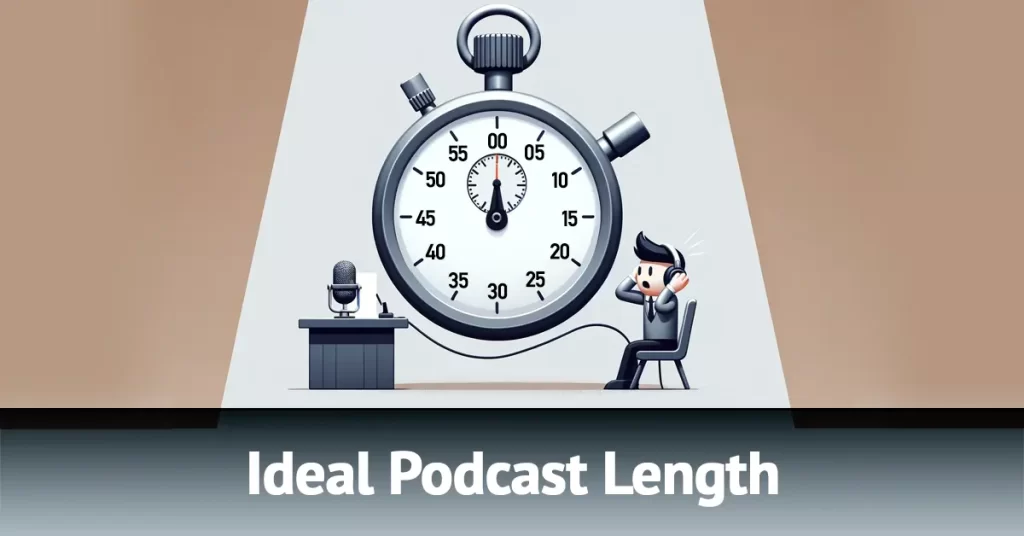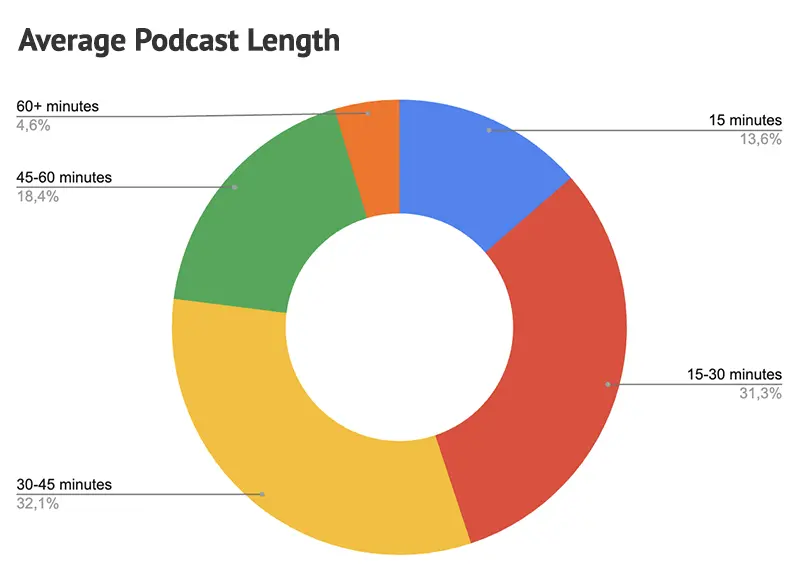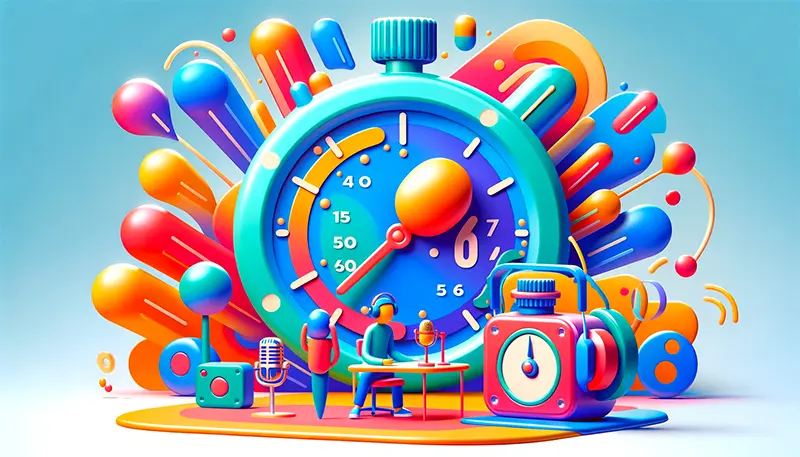“How long should my podcast be?” This is probably the #1 question that gets asked by new podcast hosts. And it’s a great question!
Finding the ideal length for your podcast episodes presents a unique set of challenges: you must balance listener engagement with content depth, ensuring episodes are neither too brief nor excessively lengthy.

Striking this balance is important because it directly impacts audience retention and listener satisfaction.
And there’s no one-size-fits-all formula for determining the perfect podcast length. However, understanding how various elements (audience preferences, content complexity, and genre expectations) affect episode duration can help creators make an informed decision.
This article will demystify these factors, helping you find the ideal running time for your podcast.
- What is the average length of a podcast episode?
- Factors that impact podcast length
- Some technical considerations to keep in mind
- Determining podcast length through testing
- Length matters
What is the average length of a podcast episode?
Podcast durations currently span a wide range, reflecting diverse listener preferences. Short-form podcasts, often under 20 minutes, are gaining popularity for their concise, focused content. Conversely, long-form podcasts, exceeding an hour, continue to thrive, offering in-depth explorations of personal, political, and business topics.
A closer look at the top-charting podcasts reveals a wide range of running times, tailored to their specific content and target audience:
- “The Daily”, a well-known news podcast, captivates over 5 million listeners with episodes generally running between 20 to 25 minutes.
- In contrast, “The Joe Rogan Experience”, one of the biggest podcasts in the world, holds the attention of 11 million listeners per episode despite its extensive 2+ hour format.
Additionally, six out of ten top podcasts in 2022 had an average episode length of less than 50 minutes, underscoring a trend towards more digestible, shorter content in the podcast industry. In saying that, a number of them extend to 60 minutes or more, proving that podcasting success relies more on content quality than length.

Similarly, Riverside’s 2023 report about branded video podcasts reveals the following:
- 13.6% of podcasts are less than 15 minutes long
- 31.3% of podcasts are between 15–30 minutes long
- 32.1% of podcasts are between 30–45 minutes long
- 18.4% of podcasts are between 45–60 minutes long
- 4.6% of podcasts are over 60 minutes long
So, while industry standards offer a helpful reference point for determining episode length, they don’t provide a clear-cut answer.

Factors that impact podcast length
Episode length should be a strategic decision informed by various factors. Here’s how to develop the perfect podcast episode duration for your specific audience niche.
The content type and format
Different podcast formats inherently lend themselves to varying episode lengths:
- Interview-style podcasts may require more time to delve into guest stories and insights, often leading to longer episodes.
- Narrative podcasts, focusing on storytelling, might vary in length depending on the complexity and depth of the story being told.
- Solo podcasts, where a single host shares insights or stories, can be shorter, offering concise, focused content.
- Co-hosted shows might lean on the longer side, due to the dynamic interactions and laidback discussion style between hosts.
Each format, with its unique requirements and flow, significantly impacts the ideal length of a podcast episode.
The topic you are covering
The topic and genre of a podcast will be a primary factor in determining its length.
For example, in the entertainment genre:
- “How To Be Amazing with Michael Ian Black”, focusing on in-depth celebrity interviews, has episodes around 60 minutes long.
- “Hollywood Handbook”, another entertainment podcast, offers a more condensed format with episodes averaging around 45 minutes.
- “Strong Opinions Loosely Held”, which delves into society and culture topics, typically has episodes around 20 minutes long.
While hosts of these shows will try to stick to those averages, you will find plenty of episodes that are 50% longer or shorter. This illustrates the flexibility within genres and the importance of tailoring episode length to the guest or topic in question.

Your audience
Understanding your audience’s characteristics is yet another factor to consider when deciding the length of your podcast. Key demographic factors include:
- Age: Young listeners who are used to short-form vertical video may struggle with attention, and will probably need shorter, punchier episodes. Older adults, however, may be more engaged with longer formats that delve into topics in depth.
- Work schedule: Commuters often look for podcasts that fit into their travel time, which averages 27 minutes.
- Lifestyle and interests: The daily routines and interests of your audience can greatly influence the ideal podcast length. For example, fitness enthusiasts might prefer 40 to 50-minute podcasts that they can listen to during a workout, while hobbyists or enthusiasts in specific fields might enjoy longer, more detailed discussions.
- Listening habits: Some audiences prefer to consume content in one sitting, while others are more inclined to listen in segments. Podcasts that cater to the ‘binge-listening’ crowd can be longer, whereas those targeting listeners who prefer shorter, more frequent content should consider shorter episodes.
- Educational background: This can affect the complexity and depth of content, thereby impacting duration.
Listeners with more leisure time, as well as niche audiences with specific interests, may gravitate towards extensive podcasts exceeding an hour, seeking depth and detailed exploration of topics of interest.
Your podcast publishing frequency
The frequency of your podcast releases can influence the ideal episode length. Daily podcasts often benefit from shorter formats, while weekly or bi-weekly podcasts might opt for longer episodes.
Maintaining consistency in your publishing schedule and episode length helps build audience expectations and loyalty. If you decide to alter your publishing frequency, consider adjusting your episode lengths accordingly.
After all, you don’t want to compromise on the quality of content you’re publishing.
Some technical considerations to keep in mind
While bigger podcast hosting platforms like Spotify for Podcasters have basically no constraints, smaller podcast hosting platforms may impose limitations on episode length or file size. It’s important to understand these restrictions, as they can directly affect your ability to upload longer episodes. Familiarize yourself with your podcast hosting provider’s guidelines to ensure your podcast adheres to these parameters.
Larger file sizes, often resulting from longer episodes, can lead to longer download times for your audience. This may affect listeners with limited bandwidth or those who download episodes for offline listening, potentially impacting listener convenience and access.
Striking a balance between quality and quantity is crucial in podcast production. Longer episodes require more editing and production resources, which can impact overall quality if not managed properly.
The goal is to always produce high-quality content. To ensure you’re publishing great episodes, it’s essential to consider the length and frequency of your episodes and to focus on enhancing your podcast production quality.

Determining podcast length through testing
Last but not least, you can experiment with various episode durations to identify what resonates best with your audience.
As you do that, monitor audience engagement. Pay attention to metrics like listen-through rates, downloads, and listener feedback — these indicators will help you understand how your audience is responding to changes in episode length.
Also, be open to evolving your podcast’s length as your content and audience grow. Changes in topics, format, or audience preferences may necessitate adjustments in episode duration.
Try to track the above-mentioned metrics and regularly reevaluate your approach to ensure your podcast remains engaging and relevant.
Length matters
The ideal podcast length depends on various factors: content type, audience, topic, publishing frequency, and technical limitations. Balancing these elements is crucial for establishing the optimal episode duration for your show.
Remember, podcast length is a dynamic element that should adapt to the evolving needs of your audience and the nature of your content. Embrace this fluidity to keep your podcast fresh, engaging, and in tune with listener expectations.